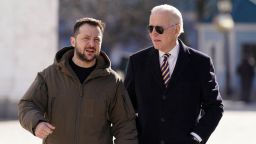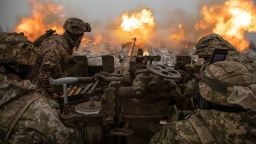Editor’s Note: Jill Filipovic is a journalist based in New York and author of the book “OK Boomer, Let’s Talk: How My Generation Got Left Behind.” Follow her on Twitter. The opinions expressed in this commentary are solely her own. View more opinion on CNN.
One year into Russia’s invasion of Ukraine, Vladimir Putin is more dangerous than ever.
The Russian dictator marked the anniversary of his unprovoked aggression – which has killed or wounded close to 200,000 of Russia’s own soldiers and turned some 16 million Ukrainians into refugees – by suspending Russia’s participation in a key nuclear arms deal that kept the threat of nuclear war at bay and giving a 100-minute speech to the country on Tuesday blaming Ukraine and its supporters for the war Putin started.

In emphasizing his vision of a conservative, traditional and patriarchal Russia at war with a more libertine West, Putin’s speech drew directly from the strongman’s playbook: Deflect blame, lie to suit your own interests, lean into a reactionary and hateful form of masculinity to get the crowds cheering.
It would be something of a pathetic showing if this particular strongman didn’t happen to have control of the largest nuclear arsenal in the world.
The nuclear agreement that Putin suspended, called New START, limited the number of nuclear missiles that both the US and Russia could have deployed and gave both nations the right to inspect each other’s nuclear sites. With Putin’s move to suspend his nation’s participation in the program, the last remaining nuclear deal between the two nations is effectively dead and we have returned to a dangerous era of nuclear dysregulation. Putin’s decision is indeed “deeply unfortunate and irresponsible,” as US Secretary of State Antony Blinken put it.
Other experts were starker in their assessments. “This is more about nuclear blackmail, but it is extremely dangerous,” Andrei Kolesnikov of the Carnegie Endowment for International Peace told the BBC, “because we cannot predict how Putin will behave in the future and what is in his mind.”
For Americans who came of age after the end of the Cold War, this renewed threat of nuclear annihilation is both new and terrifying; for those who lived through the original Cold War, this is no doubt a hair-raising reboot.
But it’s not just about a renewed nuclear threat. In Poland after an historic wartime visit to Kyiv, US President Joe Biden gave a speech of his own, also highlighting a fundamental divide – not between conservative religiosity and liberal tolerance, as Putin put it, but between autocracy and democracy. “The democracies of the world have grown stronger, not weaker,” Biden said. “But the autocrats of the world have grown weaker, not stronger.”
He continued: “That’s what’s at stake here: Freedom.”
Biden is correct that this is indeed a battle between freedom and oppression. It’s worth nothing, though, that Putin’s emphasis on cultural and gender warfare is also correct, in its own way.
He is of course lying and fear-mongering when he fulminates about same-sex marriage or the prospect of a gender-neutral God and when he says that the West seeks “the destruction of the family, cultural and national identity, perversion and the abuse of children are declared the norm.” It is true, though, that there is a clear historical and contemporary relationship between conservative religiosity and autocracy on the one hand, and liberal tolerance and democracy on the other.
Conservative religiosity is of course not a requirement for autocracy – just look at the previous era of Russian autocracy, which was decidedly irreligious. And the autocrats in Beijing, who are expanding their own nuclear arsenals and toying with lending material support to Russia, are not exactly bringing conservative Christian principles to China.
But they are embracing traditionalism, hypermasculinity and a backward-looking national identity. Among analysists of global authoritarians, a familiar refrain has emerged: Make [x country] Great Again. Xi Jinping is trying to make China great again, writes the New Yorker’s Evan Osnos. “Putin set out to ‘Make Russia Great Again,’” Gen. David Petraeus told CNN earlier this month. And, of course, we all know the American version.
In his speech, Biden took great pains to emphasize that the villain here is Putin, not Russians writ large; while Biden did frame the battle as one between freedom and totalitarianism, he did not feed into Putin’s claims that this is a war between Western liberalism and Russian traditionalism.
It’s informative, though (and scary) to realize the extent to which a number of right-wing Americans believe Putin has a point about the West being degenerate, and seem comfortable bringing a strongman in to restore the traditional order.
The most salient divide is not between East and West; it’s between those who want pluralistic liberal democracies that allow people to live freely no matter what their religious beliefs, sexual orientations and aspirations – and those who prefer autocratic strongmen who use the law to impose conservative, traditional values whether people like it or not.
Former US President Donald Trump notoriously praised Putin and trashed NATO, elevating the dictator’s status among pro-Trump conservatives. As of a year ago, Republicans in the US had a more favorable view of Putin than of Biden, Vice President Kamala Harris, former House Speaker Nancy Pelosi and the Democratic Party.
Tucker Carlson has used his influential spot on Fox News to spout pro-Putin propaganda. Newly-elected Sen. JD Vance of Ohio has said, “I don’t really care what happens to Ukraine one way or another,” while former Trump economic advisor Peter Navarro has declared Ukraine “not really a country,” and former Trump Secretary of State Mike Pompeo has praised Putin by saying, “I have enormous respect for him.”
Meanwhile, Georgia Rep. Marjorie Taylor Greene claimed that “NATO has been supplying the neo-Nazis in Ukraine with powerful weapons and extensive training on how to use them.”
On the campaign trail in November she pledged that “Under Republicans, not another penny will go to Ukraine.” Nick Fuentes, the white nationalist who recently dined with Trump and rapper Kanye West at Mar-a-Lago, told his followers, “I wish Putin was president of America.” Andrew Torba, the CEO of the right-wing platform Gab, put the issue in even starker terms last year: “What (Putin) really means is Ukraine needs to be liberated and cleansed from the degeneracy of the secular western globalist empire.”
Putin has positioned his Russia as the leading light for Christian nationalists worldwide, standing against Western secularism and decadence. And many Christian nationalists, including in the United States, have gotten in line.
Get our free weekly newsletter
- Sign up for CNN Opinion’s newsletter.
- Join us on Twitter and Facebook
This is not just a divide between Russia and the US. It’s a divide within Russia itself, as the nation’s feminists, LGBTQ rights advocates, and democracy activists continue to push (often at great personal risk) for a freer and fairer country. And it’s a divide within the US, too, between the Americans who want liberal democracy to thrive, and those who want their ideology to rule us all.
A year into Putin’s war, it’s clear that he is willing to sacrifice untold lives to cement his power and Russia’s imperial interests. Americans have a choice, both at home and abroad: Do we stand with autocrats and their small, hateful view of the world? Or do we stand for freedom and democracy – including the obligation to live among those whose views you don’t agree with and whose choices you wouldn’t make yourself?
The decision, and the stakes, couldn’t be clearer.
"behind" - Google News
February 22, 2023 at 06:58AM
https://ift.tt/u2CYKIg
Opinion: What it means to stand behind Vladimir Putin - CNN
"behind" - Google News
https://ift.tt/1Tea5gw
https://ift.tt/FK6o9Ll
Bagikan Berita Ini
















0 Response to "Opinion: What it means to stand behind Vladimir Putin - CNN"
Post a Comment